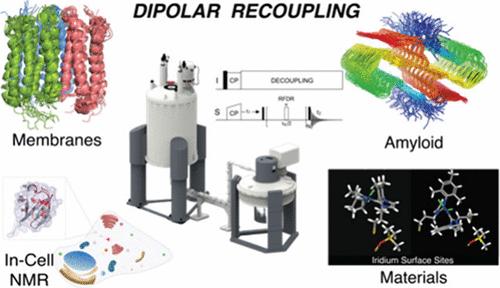当前位置:
X-MOL 学术
›
Chem. Rev.
›
论文详情
Our official English website, www.x-mol.net, welcomes your
feedback! (Note: you will need to create a separate account there.)
Dipolar Recoupling in Rotating Solids
Chemical Reviews ( IF 51.4 ) Pub Date : 2024-11-06 , DOI: 10.1021/acs.chemrev.4c00373 Vladimir Ladizhansky, Ravi Shankar Palani, Michael Mardini, Robert G. Griffin
Chemical Reviews ( IF 51.4 ) Pub Date : 2024-11-06 , DOI: 10.1021/acs.chemrev.4c00373 Vladimir Ladizhansky, Ravi Shankar Palani, Michael Mardini, Robert G. Griffin

|
Magic angle spinning (MAS) nuclear magnetic resonance (NMR) has evolved significantly over the past three decades and established itself as a vital tool for the structural analysis of biological macromolecules and materials. This review delves into the development and application of dipolar recoupling techniques in MAS NMR, which are crucial for obtaining detailed structural and dynamic information. We discuss a variety of homonuclear and heteronuclear recoupling methods which are essential for measuring spatial restraints and explain in detail the spin dynamics that these sequences generate. We also explore recent developments in high spinning frequency MAS, proton detection, and dynamic nuclear polarization, underscoring their importance in advancing biomolecular NMR. Our aim is to provide a comprehensive account of contemporary dipolar recoupling methods, their principles, and their application to structural biology and materials, highlighting significant contributions to the field and emerging techniques that enhance resolution and sensitivity in MAS NMR spectroscopy.
中文翻译:

旋转固体中的偶极再耦合
魔角旋转 (MAS) 核磁共振 (NMR) 在过去三十年中取得了长足的发展,并已成为生物大分子和材料结构分析的重要工具。本文深入探讨了偶极再耦合技术在 MAS NMR 中的开发和应用,这对于获得详细的结构和动力学信息至关重要。我们讨论了各种同核和异核再耦合方法,这些方法对于测量空间约束至关重要,并详细解释了这些序列产生的自旋动力学。我们还探讨了高自旋频率 MAS、质子检测和动态核极化的最新发展,强调了它们在推进生物分子 NMR 方面的重要性。我们的目标是全面介绍当代偶极再耦合方法、它们的原理及其在结构生物学和材料中的应用,突出对该领域的重大贡献以及提高 MAS NMR 波谱学分辨率和灵敏度的新兴技术。
更新日期:2024-11-07
中文翻译:

旋转固体中的偶极再耦合
魔角旋转 (MAS) 核磁共振 (NMR) 在过去三十年中取得了长足的发展,并已成为生物大分子和材料结构分析的重要工具。本文深入探讨了偶极再耦合技术在 MAS NMR 中的开发和应用,这对于获得详细的结构和动力学信息至关重要。我们讨论了各种同核和异核再耦合方法,这些方法对于测量空间约束至关重要,并详细解释了这些序列产生的自旋动力学。我们还探讨了高自旋频率 MAS、质子检测和动态核极化的最新发展,强调了它们在推进生物分子 NMR 方面的重要性。我们的目标是全面介绍当代偶极再耦合方法、它们的原理及其在结构生物学和材料中的应用,突出对该领域的重大贡献以及提高 MAS NMR 波谱学分辨率和灵敏度的新兴技术。


















































 京公网安备 11010802027423号
京公网安备 11010802027423号